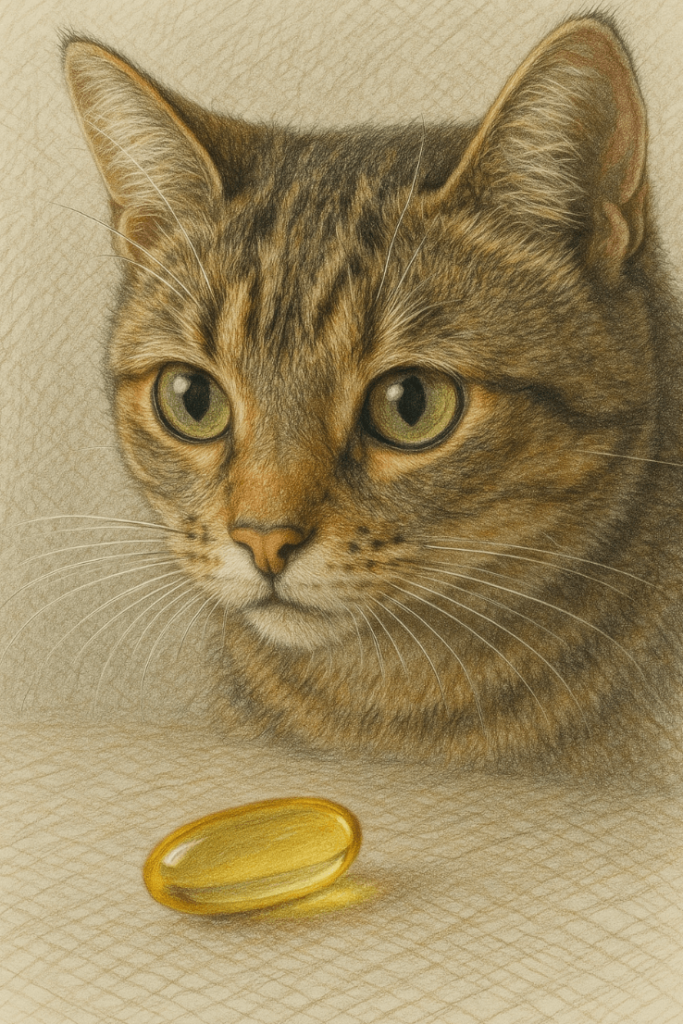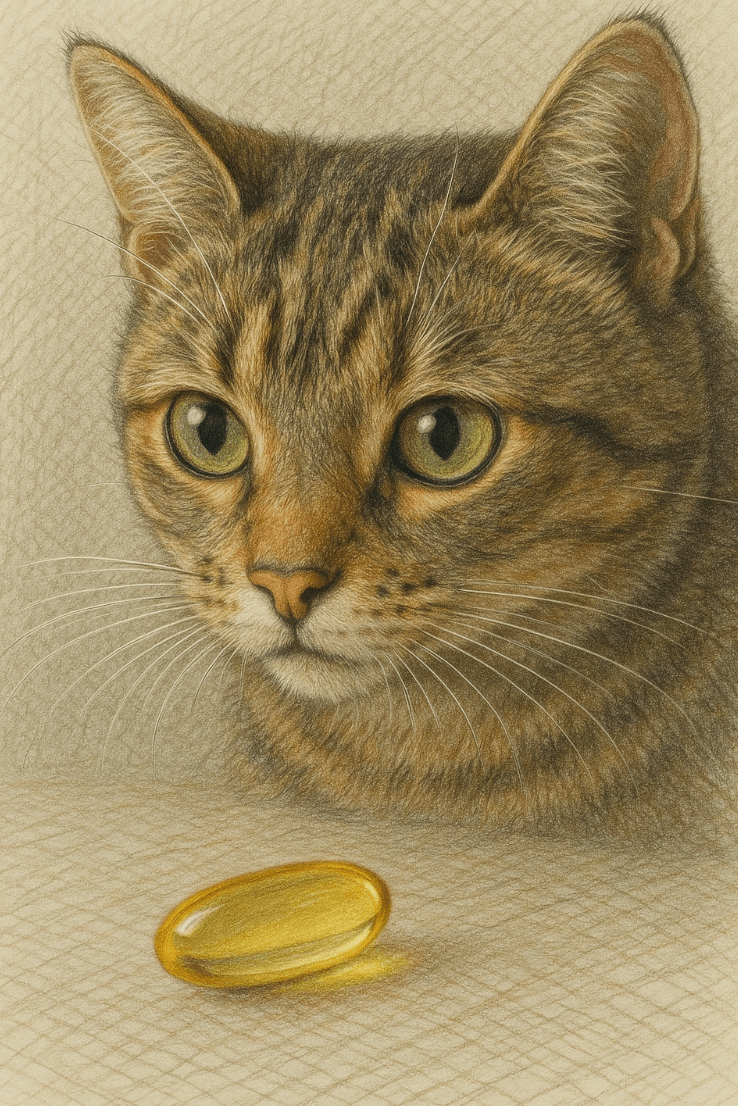Can Cats Eat Fish Oil?
Fish oil is often praised for its health benefits, particularly due to its rich omega-3 fatty acid content. But when it comes to our feline friends, can cats safely enjoy the same advantages? Many cat owners wonder if adding fish oil to their pet’s diet is a good idea or if it could pose risks. The truth is, fish oil can be highly beneficial for cats, supporting everything from skin and coat health to joint mobility and heart function.
However, it’s crucial to understand how much to give, what type to use, and any potential downsides. In this blog post, we’ll explore everything you need to know about feeding fish oil to your cat, ensuring you make informed decisions for their well-being.
Benefits of Fish Oil for Cats
Fish oil offers numerous health benefits for cats, making it a popular supplement among pet owners. Here are some of the key advantages your feline friend might experience when given fish oil in moderation.
Improved Skin and Coat Health:
Omega-3 fatty acids in fish oil help reduce dryness, flakiness, and itchiness, promoting a shiny, healthy coat.Joint Support for Senior Cats:
Fish oil has anti-inflammatory properties that can ease joint pain and stiffness, especially in older cats with arthritis.Heart Health Boost:
Omega-3s support cardiovascular function, reducing the risk of heart disease in cats prone to cardiac issues.Enhanced Immune System:
The nutrients in fish oil can strengthen your cat’s immune response, helping them fight off illnesses more effectively.Brain Development in Kittens:
For growing kittens, omega-3 fatty acids play a vital role in cognitive development and overall brain health.
By incorporating fish oil into your cat’s diet responsibly, you can help them enjoy these wide-ranging health benefits.
Potential Risks of Feeding Fish Oil to Cats
While fish oil is generally safe, there are some risks to be aware of before introducing it to your cat’s diet. Understanding these concerns ensures you use it safely and appropriately.
Digestive Upset:
Too much fish oil can cause diarrhea, vomiting, or loose stools, disrupting your cat’s digestive system.Caloric Overload:
Fish oil is calorie-dense; excessive amounts can lead to weight gain, which may harm overweight cats.Vitamin E Depletion:
High doses of omega-3s can deplete vitamin E levels in your cat’s body, potentially leading to deficiencies.Allergic Reactions:
Some cats may have sensitivities to fish-based products, resulting in itching, swelling, or other allergic symptoms.Quality Concerns:
Low-quality fish oil supplements may contain contaminants like mercury or toxins, posing health risks to your cat.
Being mindful of these risks allows you to introduce fish oil safely and avoid unnecessary complications.
Check this guide 👉Can Cats Eat Eucalyptus? Best 7 Expert Tips!
Check this guide 👉Can Cats Eat Brownies? Best 7 Expert Tips!
Check this guide 👉Can Cats Eat Pothos? Best 7 Expert Tips!

Benefits of Fish Oil for Cats | Risks of Fish Oil for Cats |
|---|---|
Promotes healthy skin and coat | Can cause digestive upset |
Supports joint mobility and comfort | May contribute to weight gain |
Boosts heart and immune system health | Risk of vitamin E depletion |
Aids brain development in kittens | Potential for allergic reactions |
Reduces inflammation in the body | Contaminants in low-quality supplements |
How to Safely Introduce Fish Oil to Your Cat’s Diet
If you decide to give your cat fish oil, it’s important to do so carefully to ensure their safety and well-being. Follow these guidelines for a smooth transition.
Choose High-Quality Supplements:
Opt for purified, veterinarian-recommended fish oil products free from harmful contaminants.Start with Small Doses:
Begin with a minimal amount to gauge your cat’s tolerance before gradually increasing the dosage.Mix with Food:
Add fish oil to your cat’s regular meals to mask the taste and encourage consumption.Monitor for Side Effects:
Watch for signs of digestive upset or allergic reactions, and adjust the dosage accordingly.Consult Your Veterinarian:
Before starting any supplement, seek professional advice to determine the right amount for your cat’s specific needs.
By following these steps, you can safely incorporate fish oil into your cat’s diet without causing harm.
Signs Your Cat May Benefit from Fish Oil
Certain behaviors or health issues may indicate that your cat could benefit from the addition of fish oil to their diet. Look out for these signs as cues to consider supplementation.
Dry, Flaky Skin or Excessive Shedding:
These symptoms often point to a lack of essential fatty acids that fish oil can provide.Stiff Movements or Difficulty Jumping:
If your cat struggles with mobility, fish oil’s anti-inflammatory properties may offer relief.Dull or Greasy Coat:
A lackluster coat can signal nutritional deficiencies that omega-3s can help address.Frequent Ear or Skin Infections:
Recurring infections may indicate an immune system that could benefit from omega-3 support.Slow Wound Healing:
Omega-3 fatty acids promote faster healing by supporting cell regeneration and tissue repair.
Recognizing these signs ensures you address potential health concerns proactively with fish oil.
Common Mistakes to Avoid When Giving Fish Oil to Cats
Feeding fish oil to your cat requires careful consideration to avoid mistakes that could harm their health. Here are some pitfalls to watch out for.
Overdosing on Omega-3s:
Too much of a good thing can lead to adverse effects—stick to the recommended dosage.Using Low-Quality Products:
Cheap or untested supplements may contain harmful contaminants like mercury or PCBs.Ignoring Veterinary Advice:
Skipping a vet consultation can result in inappropriate dosages or unsuitable products.Adding Too Much Calorie Intake:
Fish oil is calorie-dense; overfeeding can lead to unhealthy weight gain in sedentary cats.Not Monitoring for Allergies:
Failing to observe your cat’s reaction can delay identifying potential allergic responses.
Avoiding these mistakes ensures your cat enjoys the benefits of fish oil safely.
Alternatives to Fish Oil for Cats
If fish oil isn’t suitable for your cat, there are alternative ways to provide omega-3 fatty acids. These options cater to different preferences and dietary needs.
Krill Oil:
Rich in omega-3s and easier to digest than fish oil, krill oil is a great alternative for sensitive cats.Algae-Based Supplements:
Plant-based omega-3 sources like algae oil are ideal for cats with fish allergies or sensitivities.Flaxseed Oil (Limited Use):
While not as effective as marine-based oils, flaxseed oil contains omega-3s that can be beneficial in small amounts.Omega-3 Enriched Cat Foods:
Some commercial cat foods are fortified with omega-3 fatty acids, eliminating the need for separate supplements.Natural Sources:
Small amounts of cooked salmon or sardines can provide omega-3s naturally, though they shouldn’t replace balanced nutrition.
These alternatives offer flexibility for cats who may not tolerate fish oil well.
Tips for Choosing the Best Fish Oil Supplement
Selecting the right fish oil product is crucial for ensuring your cat’s safety and maximizing the benefits. Keep these tips in mind when shopping for supplements.
Look for Third-Party Testing:
Choose products tested by independent labs to confirm purity and potency.Check for EPA and DHA Content:
Ensure the supplement lists specific amounts of eicosapentaenoic acid (EPA) and docosahexaenoic acid (DHA), the active omega-3 components.Avoid Artificial Additives:
Steer clear of supplements containing artificial flavors, colors, or preservatives that could irritate your cat’s system.Opt for Liquid Form:
Liquid fish oil is often easier to mix into food compared to capsules, which may require breaking open.Consider Sustainability:
Choose eco-friendly brands that source fish sustainably to minimize environmental impact.
Following these tips helps you find a safe, effective fish oil supplement tailored to your cat’s needs.
Frequently Asked Questions About Cats and Fish Oil
How much fish oil should I give my cat?
Dosage varies by size and health condition; consult your vet for personalized recommendations, but 1/4 teaspoon daily is a common starting point.
Can I use human fish oil supplements for my cat?
While possible, human supplements may not be formulated for cats and could contain harmful additives—always choose pet-specific products.
Are there alternatives to fish oil for omega-3s?
Yes, krill oil or algae-based omega-3 supplements are suitable alternatives for cats sensitive to fish.
What happens if my cat eats too much fish oil?
Overconsumption can lead to digestive upset, weight gain, or vitamin E depletion—stick to recommended dosages.
Can kittens eat fish oil?
Yes, but only under veterinary supervision, as their nutritional needs differ from adult cats.
Making the Most of Fish Oil for Your Cat’s Health
Fish oil can be a wonderful addition to your cat’s diet, offering numerous health benefits when used responsibly. From improving their skin and coat to supporting joint and heart health, the advantages are clear. However, it’s equally important to be aware of potential risks and take precautions to ensure safe usage. By choosing high-quality products, monitoring your cat’s response, and consulting your veterinarian, you can harness the power of fish oil to enhance your feline friend’s quality of life. Remember, every cat is unique—tailor their care to meet their individual needs for optimal results.
Pemphigus Erythematosus in Cats: Best 7 Expert Tips! – Learn to recognize symptoms, manage flare-ups, and improve your cat’s quality of life.
Pemphigus Erythematosus in Dogs: Best 7 Expert Tips! – Discover causes, symptoms, and treatment options to manage this autoimmune skin condition effectively.
Cat Tympanic Membrane: Best 7 Expert Tips! – Learn how to protect your cat’s eardrum, spot issues early, and ensure lifelong auditory health.
Dog Tympanic Membrane: Best 7 Expert Tips! – Learn how to protect your dog’s eardrum, spot issues early, and ensure lifelong ear health with expert advice.





